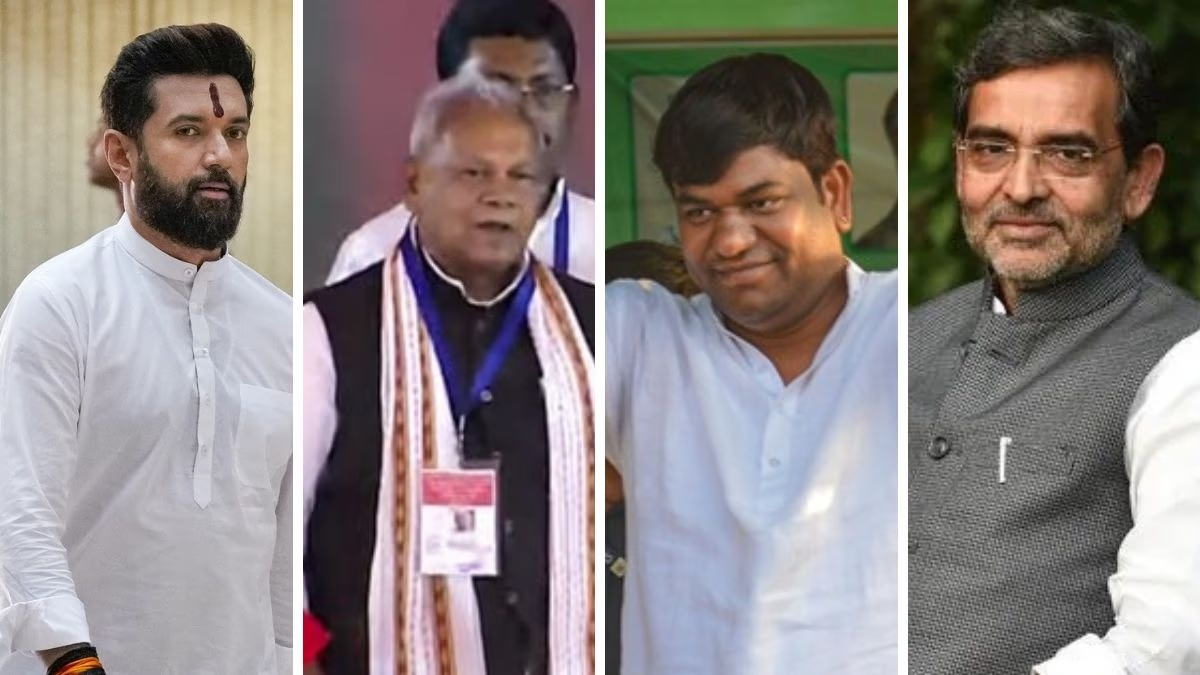Bihar is often perceived as a state where politics is inseparable from caste dynamics. As the state stands on the brink of assembly elections, discussions about Bihar's politics inevitably steer towards caste. Political strategist turned politician Prashant Kishor, who entered the political river of Bihar with the ship of the Jan Suraj Party, has pointed out that any leader will inevitably belong to some caste.
The importance of caste in Bihar's politics is highlighted by the fact that parties are engrossed in analyzing the number of castes, their allied and opposing castes, at the assembly level before distributing tickets. The political foundation of the opposition Mahagathbandhan in Bihar, led by the Rashtriya Janata Dal (RJD), is considered to be the M-Y (Muslim-Yadav) equation.
Whether it's the ruling National Democratic Alliance (NDA) led by the Janata Dal (United) or the largest party, the Bharatiya Janata Party (BJP), even those engaged in governance and development politics have their caste-based foundations. Amid this cocktail of politics and caste, we also discuss caste-based parties. The Indian Inqlab Party, led by IP Gupta of the Paan community, is the newest player, but many parties and leaders have had a strong presence on the pitch of caste-based politics for quite some time. Today, in the Bihar series, we talk about such leaders and parties.
Chirag Paswan's Party Rests on Dalit Votes
From its inception, the politics of the Lok Janshakti Party (Ram Vilas), led by Chirag Paswan, has been based on the Dalit vote bank. The Lok Janshakti Party (LJP), founded by Chirag's father Ram Vilas Paswan, was considered the vanguard of Dalit politics in Bihar. Later, the NDA government led by Nitish Kumar divided Dalit castes into two categories - Dalit and Mahadalit. The Paswan or Dusadh caste, which forms the core vote bank of the Paswan family, was excluded, while the remaining 21 Dalit castes were granted Mahadalit status. At that time, the LJP led by Ram Vilas Paswan was not part of the NDA.
Talking about the Dalit community, i.e., Paswans, according to the 2023 caste census, they comprise 5.31% of Bihar's population. Although from a numerical strength perspective, the core vote bank of LJP (R) might seem inadequate to single-handedly win or access power in Bihar, its alliance with another party can definitely sway election results. Perhaps this is why both the NDA and the Mahagathbandhan are eager to form alliances with Chirag's party.
Currently, Chirag Paswan's party is a component of the ruling NDA, led by JDU in Bihar. Chirag Paswan continuously attempts to expand his party's vote base. The state president of Chirag's party, Raju Tiwari, hails from the upper caste. Campaigns like 'Bihar First, Bihari First' are seen as part of Chirag's efforts to establish a political foothold among the entire society, especially the youth. Of the 243 seats in the Bihar Assembly, 38 are reserved for scheduled castes.
Jitan Ram Manjhi’s Party Banks on Musahar Votes
After separating from JDU, former Chief Minister Jitan Ram Manjhi founded his party, Hindustani Awam Morcha (Democratic), in 2015. Manjhi’s party is part of the NDA. MP from Gaya, Manjhi is a minister in the central government from the Hindustani Awam Morcha quota, while his son Santosh Suman is part of the Nitish Kumar government. Jitan Ram Manjhi belongs to the Musahar caste, categorized under the Mahadalit group.
Approximately 14% of Bihar's population belongs to the Mahadalit group. Manjhi's party lays claim to the Mahadalit vote bank. However, the core vote bank of Jitan Ram Manjhi's party is considered to be the Musahar caste, which constitutes 3.09% of Bihar's population. The Musahar community is predominantly located in the Gaya and Jehanabad districts. In Supaul, Araria, Kishanganj, Purnia, and Katihar, the Manjhi community plays a decisive role in determining electoral outcomes on about a dozen seats.
Mukesh Sahni's Party Claims Nishad Vote Bank
Led by Mukesh Sahni, the Vikasheel Insaan Party (VIP) is aligned with the opposition Mahagathbandhan. The core vote bank of VIP is considered to be the Sahni community, which, according to caste census figures, makes up 2.61% of Bihar’s population. However, VIP claims the Nishad vote bank, which, including sub-castes associated with Sahni, accounts for 9.65% of the population.
The Nishad caste encompasses sub-castes like Sahni (Mallah), Amat, Kevat, Kevart, Kol, Gondi Chhabi, Gond, Gangei (Ganesh), Gangota, Ghatwar, Chay, Tiwar, Turha, Ghimar, Noniya, Bind, Beldar, Majhwar, Moriyari, and Vanpar. The Nishad vote bank holds significant sway in determining election results in Darbhanga, Madhubani, Muzaffarpur, Vaishali, and Khagaria districts.
Strength of Upendra Kushwaha's Party
Led by Upendra Kushwaha, the Rashtriya Lok Samata Party (RLSP) is a component of the NDA, with its core voter being the Koeri community. Union Minister Upendra Kushwaha himself belongs to this community. The Koeri community constitutes 4.21% of Bihar’s population. It's important to note that the alliance between the Koeri and Kurmi communities, termed the Luv-Kush equation, played a significant role in Nitish Kumar's success with JD(U) and the NDA.
Last year’s Lok Sabha elections witnessed the RJD, led by Lalu Yadav, fielding Koeri candidates on three seats, one of whom succeeded. The RJD appointed Abhay Kushwaha, a Koeri leader, as the leader of the party’s parliamentary group in the Lok Sabha.
The Koeri fondness of political parties can be understood from the fact that despite Upendra Kushwaha losing the Lok Sabha election, he was sent to the Rajya Sabha by BJP, which made him a minister at the center. Belonging to the Koeri community, Samrat Chaudhary is the Deputy CM in the Nitish government from the BJP quota. The Koeri population is substantially present in the districts of Aurangabad, East Champaran, West Champaran, Samastipur, Khagaria, Sitamarhi, Purnia, Jamui, Nalanda, and Arrah.




